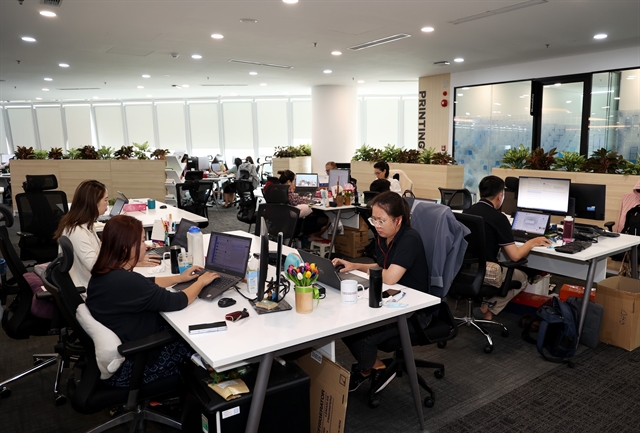 Society
Society

 |
| Office workers are among the groups that must make the most effort to adapt to artificial intelligence (AI). — VNA/VNS Photo |
HÀ NỘI — As artificial intelligence (AI) increasingly shapes the labour market, the question for workers is no longer whether AI will take their jobs, but how they can adapt and master the technology to thrive in this new environment.
AI is transforming every aspect of life, boosting efficiency and productivity while simultaneously presenting challenges, particularly for low-skilled workers.
According to the International Labour Organization (ILO), approximately 2.3 per cent of employment worldwide, or 75 million jobs, is at risk of automation due to high exposure to generative AI technology. Currently, humans perform 47 per cent of labour tasks, but this figure is projected to fall to 33 per cent by 2030. In the finance and securities sector, human involvement may decrease from 44 per cent to 28 per cent.
Automation is not only reducing manual roles but also hybrid tasks shared between humans and machines. However, experts emphasise that AI cannot fully replace humans, as it remains limited in tasks requiring emotional intelligence, social interaction, and real-world adaptability. With the right skills, workers can turn AI into an assistant rather than a rival.
The World Economic Forum (WEF) forecasts that up to 23 per cent of jobs could disappear from the market within the next five years. Repetitive roles, including data entry, telemarketing, accounting, delivery, dubbing, and graphic design, are the most vulnerable. Conversely, AI is also creating new opportunities, producing roles such as AI specialists, AI trainers and tuners, risk managers, AI psychologists, AI editors and non-AI content creators. Those who master AI tools can gain a significant edge, working faster, learning more efficiently and being more creative.
To mitigate risks and seize opportunities, investment in retraining and upskilling is essential, especially in areas that are difficult to automate, such as counselling and education. With proper adaptation, AI can not only restructure the labour market but also promote sustainable growth, with benefits shared more equitably.
Lê Công Thành, chairman and CEO of Information Retrieval Technology Company (InfoRe) and founder of the project Bình dân học AI (AI Literacy for All), likened AI to a new kind of labour tool. Speaking to Voice of Vietnam (VOV), he explained that since the emergence of modern AI nearly three years ago, the technology has evolved rapidly and is now entering its fourth generation.
In its early stages, AI merely conversed and answered questions with high error rates. Later generations developed reasoning capabilities, allowing AI to self-correct and refine responses with high accuracy. In the fourth generation, AI not only reasons but also coordinates multiple tools over extended periods and begins generating new content. Experts predict that reasoning-capable AI will grow exponentially by 2026, meaning the technology will no longer be a simple tool but an active influencer of the labour market.
Thành said this development presents a major challenge for the global workforce. In Việt Nam, where much of the labour force engages in assembly, outsourcing, or repetitive tasks for foreign markets, the risk of replacement is especially pronounced as developed nations transition to AI. Yet, new opportunities are emerging.
Vietnamese workers have near-simultaneous access to AI technologies compared to developed countries. While major corporations have researched AI for decades, ordinary workers in these markets have only begun learning to master AI over the past two years. If they move quickly, they can compete in the global labour market.
“If we fall behind, domestic workers will lose their advantage and be replaced by those who have already adapted to AI,” he said, highlighting that office workers, who spend much of their time in front of screens, are most affected. “If they know how to leverage AI, their productivity could increase manyfold. Otherwise, replacement will come swiftly.”
Thành stressed that mastering AI is a practical skill that must be developed through consistent daily practice. Like learning to swim, playing an instrument, or driving, the skill can only be honed with repeated effort. Within the next five to ten years, AI may create countless new professions beyond human imagination, potentially allowing each person to hold a unique, individualised job. — VNS